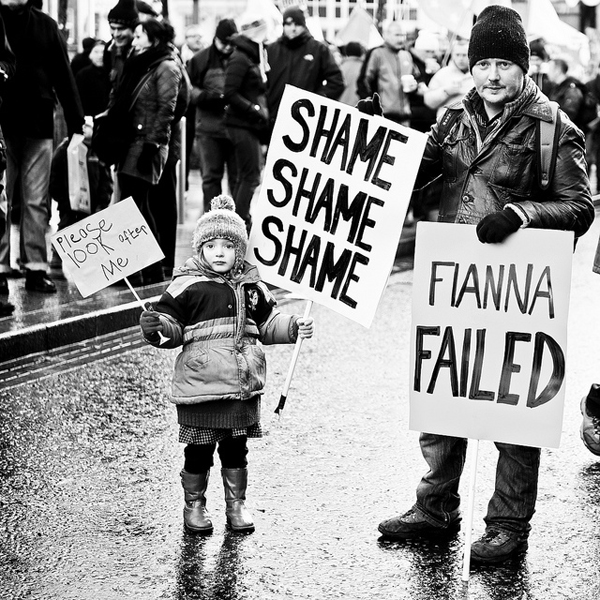
Following the 25 February General Election, negotiations are continuing between Fine Gael and the Labour Party, who are set to form a new coalition government. Whatever the finer details of the coalition agreement, the new government will not extract Ireland from its financial and social crisis.
The Irish parliament has 166 seats. Fine Gael now has 76 TDs (members of parliament), who will be able to govern in coalition alongside Labour’s 37 elected representatives, at the expense of the outgoing Fianna Fail/Green coalition, which the electorate overtly punished for its part in the crisis. Previous ruling party Fianna Fail’s parliamentary representation was drastically reduced from 73 to just 20, while the Green Party, which previously held six seats, is now in the political wilderness, having lost them all.
Sinn Fein (which joined the unanimous call of all parties for low business taxes) did well in the election, with its representation increased from five to 14 TDs. Sinn Fein leader Gerry Adams topped the poll in the border county of Louth and will take up his seat in parliament. Sinn Fein says that it is the only party which can fight the cuts in the Twenty Six counties; however in the Six Counties (north of Ireland), its elected representatives – governing together with the right wing Democratic Unionist Party – are implementing savage cuts. The United Left Alliance, a coalition of various left-wing parties, won five seats.
Both Fine Gael leader Enda Kenny, who is likely to be the new Prime Minister, and Labour Party leader Eamon Gilmore are pledging to seek renegotiation of the terms of the International Monetary Fund and European Union bail out. (See FRFI 218 Ireland – economic crisis escalates) In reality, Germany and Britain will assert their dominance as major creditor nations in the Irish debt crisis. In the coming months, the new ruling coalition’s campaign rhetoric will collide with the realities of governance. The new government inherits a four-year austerity programme brought in by Fianna Fail and the Green Party.
Fianna Fail has been dealt a massive blow. The party held power for 20 of the past 23 years and has formed governments in 60 of the 89 years since the creation of the Dail (parliament) following the 1921 Partition of Ireland into the southern Twenty Six Counties and the occupied northern Six Counties. Prior to the election 35 of its TDs retired from politics, including Brian Cowan, who became Ireland’s first sitting Prime Minister not to stand for re-election.
It is unclear for how long the current social and political peace will hold in Ireland. The real battles are yet to begin: job losses and insecurity are on the increase, in 2007 unemployment stood at 4.7%, today it is over 13.3%; this is only offset by increasing migration. Every week 1,000 people migrate overseas; as one young woman told RTE television, ‘you don’t go to parties any more, you go to going away parties’.
In 2008, when the current crisis began, Ireland had the highest birth rate (18.1 per 1,000), lowest death rate (6.1 per 1,000), highest net migration rate (14.1 per 1,000) and largest population growth rate (4.4%) of the 27 member states of the European Union. The current generation of young people in Ireland neither belongs to nor follows the traditional civil war politics which have dominated Irish political life since Partition. Instead, they are concerned about a much more immediate crisis, which is attacking their access to jobs and housing.
The economic crisis is still in its infancy and political forces capable of resisting the savage cuts and attacks on living standards, which will intensify in the period ahead, are yet to develop. However, it is clear that the outcome of the election will not alter the social and economic situation in Ireland, and that a deepening crisis lies ahead.
Paul Mallon




